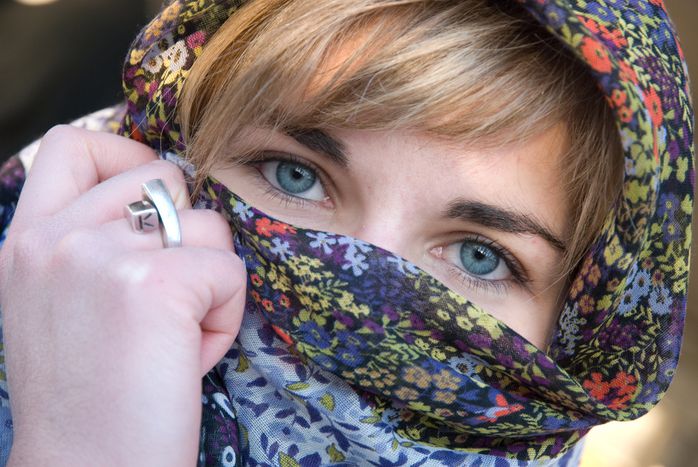
Magyar muslims: Budapest’s integrated communities
Published on
Hungry is a predominantly roman catholic country. This 'historic religion' - a term also covering lutheranism, the reformed churches and the jewish community - covers around 20% of the population. The official 'non-historic' churches in Budapest for two muslim communities from its ottoman heritage belittle a 2011 bill no longer recognising islam
It is a Friday noon in Budapest's Safrany street. A shy looking mosque is open for the faithful, who flock for the most important prayer in the week, the Jumu'ah. Yet the usual prayer call doesn't reverberate in the neighborhood. Located in a newly-constructed building that looks like a seat of a state institution, the mosque boasts the Hungarian national flag and the flag of the European union. There are no signs for unsuspecting passersby that this is a house of god; a woman wearing a veil is the only give-away sign.
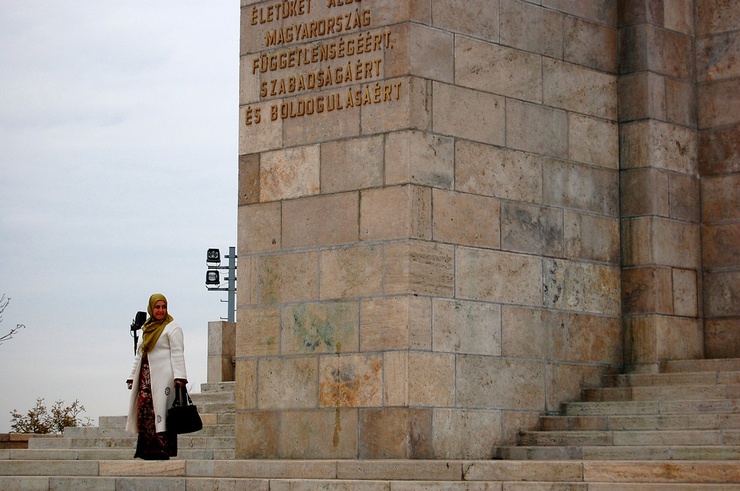
Islamic ‘churches’ in Budapest
Inside, the faithful enter a spacious main hall of the mosque, designated for prayer. Neatly carpeted and bathed in light, the prayer room looks big enough to receive tens of worshippers. Yet minutes before the start of Jumu’ah, only a dozen men are here – women pray in a separate, smaller room across the hall. The mosque is maintained by the organisation of muslims in Hungary, founded in 2000, otherwise known as the paradoxical-sounding Hungarian islamic church (Magyarországi Muszlimok Egyháza, MME), in accordance with the official legal term coined because of the 1990 Hungarian act on religion – a church being a legal entity sui generis as in the Netherlands, thus a religious organisation recognised by the state. The Hungarian islamic church is one of the two islamic communities registered in the capital; there are four in total across the country.
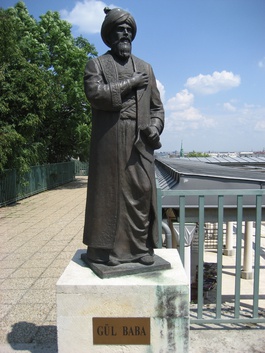 Hungarian-born Szultan Sulok runs the organisation from an office located in the mosque. ‘We just moved here since the community grew,’ he tells me in an office reigned by creative chaos, with books and notes everywhere. Sulok estimates that most of Hungary’s 32, 000 muslims live in Budapest. The figure is contested by the other registered community in Hungary, the Hungarian islamic community, which sets the number at some 60, 000 muslims. Hungarian history, Budapest’s in particular, is strongly coloured by its muslims and islam. In the present-day capital, only a handful of historical reminders of its muslim past remain. The most notable one is the tomb of Gul Baba, a medieval Turkish military leader who died in the battle for Budim, Budapest’s part on the west bank of Danube. From an insignificant town, Budim turned into an important urban centre. The city boasted over sixty mosques and accompanying libraries and Turkish baths – some of which survived until today as monuments.
Hungarian-born Szultan Sulok runs the organisation from an office located in the mosque. ‘We just moved here since the community grew,’ he tells me in an office reigned by creative chaos, with books and notes everywhere. Sulok estimates that most of Hungary’s 32, 000 muslims live in Budapest. The figure is contested by the other registered community in Hungary, the Hungarian islamic community, which sets the number at some 60, 000 muslims. Hungarian history, Budapest’s in particular, is strongly coloured by its muslims and islam. In the present-day capital, only a handful of historical reminders of its muslim past remain. The most notable one is the tomb of Gul Baba, a medieval Turkish military leader who died in the battle for Budim, Budapest’s part on the west bank of Danube. From an insignificant town, Budim turned into an important urban centre. The city boasted over sixty mosques and accompanying libraries and Turkish baths – some of which survived until today as monuments.
Integrated community
After the Turkish siege at Vienna (1683), it took three years for the Austrian army to reclaim Budim. The golden era of islamic culture was over for the city. Its muslim population was either expulsed or converted. The return of islam to Budapest had to wait until the 19th century and Austro-Hungarian annexation of Bosnia. Bosnian muslims came to Budapest, often for military service, and formed a community there. The Hungarian islamic community, which does not use the word 'church', still cherishes strong links with Bosnian muslims, considering a Bosnian military imam who lived in Budapest before the first world war and the fall of Austro-Hungarian empire as its father-founder. The community’s head, Zoltan Bolek, greets me at his mosque in Robert Karoly street. Unlike the shiny and new mosque of the islamic church, this one is more modest and marked by time. The walls of the hallway leading to the room for prayer are covered with photos. The central spot is reserved for the first imam, the Bosniak military officer.
‘Hungarians are tolerant’
‘Hungarians are tolerant,’ says Bolek. Prior to the new bills by the centre-right party fidesz, the state fully recognised his organisation as a traditional religious community; indeed, islam was first legalised in Hungary with Act XVII of 1916, and this Austro-Hungarian protection has never been abolished. Bolek's views are identical to Szultan Sulok’s, echoing the view that there is no discrimination against muslims. This runs contrary to the general social trends in Hungary, with radical movements and far-right parties being on the rise. The infamous anti-jewish and anti-Roma jobbik party, known for its hardline approach to minorities of all kinds, is increasingly gaining popularity. However, the imam at this Hungarian islamic community’s mosque, Jozsef Bordas, denounces the party’s policies as hypocritical: ‘Jobbik wants to open to the east, but they sell radical ideas to the voters.'
Unity vs. pluralism
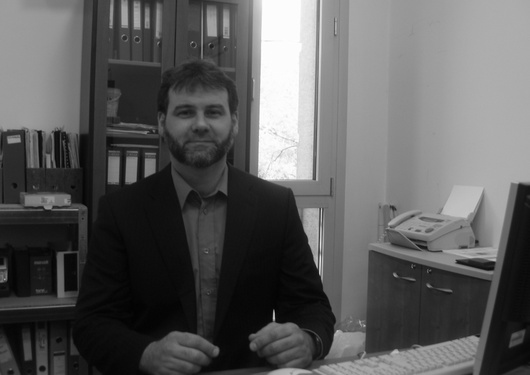 Not all of Budapest’s muslims pray in the two official mosques. A dozen of smaller praying places, masjids, are scattered across the city, located mostly in flats or ground floor business offices, like the one in Budapest’s iconic Bela Bartok street. However, the place is closed for the faithful on this Friday afternoon. Masjids and mosques are operated independently by local communities with no solid cohesion among them. Opinions on whether a single national islamic community would be a solution differ. ‘One (islamic) community would not be good,’ says Sulok. He regards pluralism as being the right value for Hungarian Muslims. Although islam is the general frame, within the faith there is a dynamic myriad of different currents and factions, resulting in different organised communities.
Not all of Budapest’s muslims pray in the two official mosques. A dozen of smaller praying places, masjids, are scattered across the city, located mostly in flats or ground floor business offices, like the one in Budapest’s iconic Bela Bartok street. However, the place is closed for the faithful on this Friday afternoon. Masjids and mosques are operated independently by local communities with no solid cohesion among them. Opinions on whether a single national islamic community would be a solution differ. ‘One (islamic) community would not be good,’ says Sulok. He regards pluralism as being the right value for Hungarian Muslims. Although islam is the general frame, within the faith there is a dynamic myriad of different currents and factions, resulting in different organised communities.
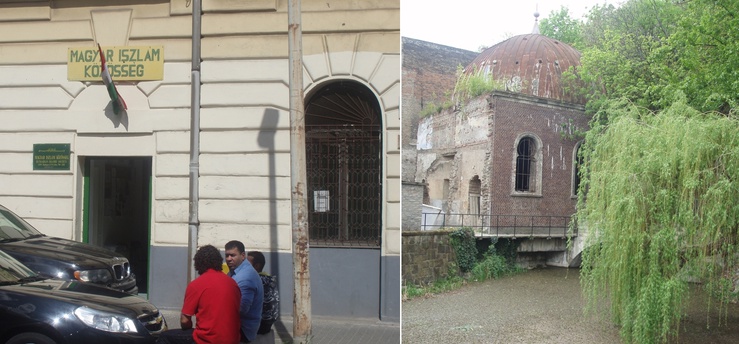
Sulok finds the concept of a European islamic community, organised according to the model of catholic church, a more appealing idea; a council of European imams. The Hungarian islamic community doesn’t share this view with the islamic church. ‘A single European islamic community is a good idea,’ says Bolek. ‘It would be nice to have one (European) grand mufti. There should be one (national) community. We have no problems with different interpretations of islam. We are accepting of other opinions.’ Imam Bordas is somewhat sceptical. ‘Other communities don’t respect other interpretations. Practically, it cannot be done.’
Many thanks to cafebabel.com Budapest and especially Bernardett Bucs
This article is part of cafebabel.com’s 2011-2012 feature focus on the Balkans, Orient Express Reporter 2, a project co-funded by the European Commission and with the support of Allianz Kulturstiftung.
Image: main (cc) .craig/ anabadili.com; Guel Baba statue (cc) muppetspanker; head scarf woman at Budapest monument (cc) Nagy David/ all courtesy of flickr; all other in-text © Rasid Krupalija for Orient Express Reporter Budapest, 2012/ video (cc) WadoodHUN/ youtube



